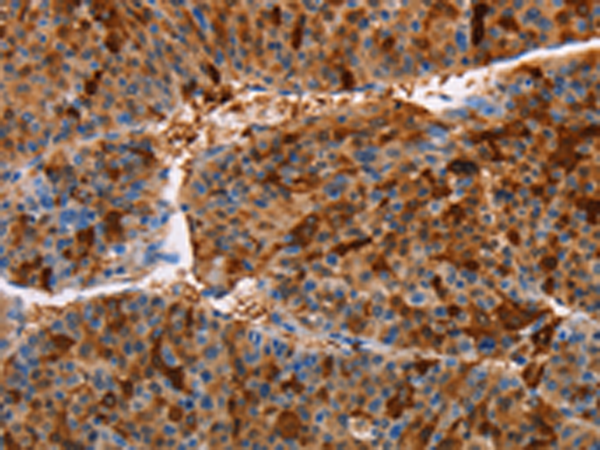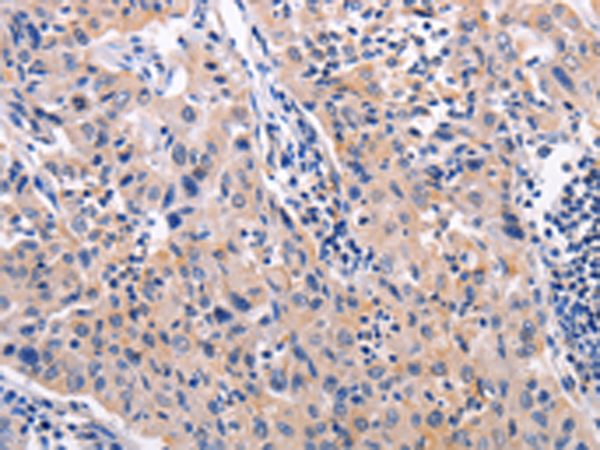


| WB | 咨询技术 | Human,Mouse,Rat |
| IF | 咨询技术 | Human,Mouse,Rat |
| IHC | 1/25-1/100 | Human,Mouse,Rat |
| ICC | 技术咨询 | Human,Mouse,Rat |
| FCM | 咨询技术 | Human,Mouse,Rat |
| Elisa | 1/2000-1/5000 | Human,Mouse,Rat |
| Aliases | HIS; HSI; ARL1; ARL-1; ALDRLn; AKR1B11; AKR1B12 |
| WB Predicted band size | 36 kDa |
| Host/Isotype | Rabbit IgG |
| Antibody Type | Primary antibody |
| Storage | Store at 4°C short term. Aliquot and store at -20°C long term. Avoid freeze/thaw cycles. |
| Species Reactivity | Human |
| Immunogen | Fusion protein of human AKR1B10 |
| Formulation | Purified antibody in PBS with 0.05% sodium azide and 50% glycerol. |
+ +
1. **"AKR1B10 as a biomarker for hepatocellular carcinoma" by Yan et al.**
该研究通过免疫组化分析,证实AKR1B10在肝癌组织中高表达,提出其作为肝癌早期诊断及预后的潜在生物标志物。
2. **"AKR1B10 overexpression in colorectal cancer and chemoresistance" by Li et al.**
利用Western blot和免疫荧光技术,发现AKR1B10在结肠癌中显著上调,并与5-氟尿嘧啶耐药性相关,提示其作为治疗靶点的可能性。
3. **"AKR1B10 in lung adenocarcinoma: Diagnostic implications" by Wang et al.**
通过组织芯片和免疫组化检测,发现AKR1B10在肺腺癌中特异性高表达,可作为区分腺癌与其他肺部病变的辅助诊断指标。
4. **"AKR1B10 expression correlates with breast cancer progression" by Chen et al.**
研究采用免疫组化及生存分析,揭示AKR1B10在乳腺癌中的高表达与肿瘤转移、复发及患者不良预后显著相关。
The AKR1B10 (aldo-keto reductase family 1 member B10) antibody is a key tool for studying the role of AKR1B10. an enzyme implicated in cancer metabolism and chemoresistance. AKR1B10 belongs to the aldo-keto reductase superfamily, which catalyzes the reduction of carbonyl compounds, including toxic aldehydes and ketones, into their corresponding alcohols. Initially identified as a liver-specific protein, AKR1B10 is overexpressed in several cancers, such as hepatocellular carcinoma, lung adenocarcinoma, and breast cancer, where it promotes cell proliferation, detoxification of chemotherapeutic agents (e.g., daunorubicin), and lipid metabolism regulation. Its upregulation is associated with poor prognosis and resistance to therapies.
Antibodies targeting AKR1B10 are widely used in research to detect its expression and localization in tissues or cell lines via techniques like Western blotting, immunohistochemistry (IHC), and immunofluorescence (IF). These antibodies help elucidate AKR1B10's functional roles, such as its interaction with retinoid metabolism pathways or involvement in oxidative stress responses. Monoclonal antibodies against AKR1B10 are particularly valuable for specificity in distinguishing it from homologous enzymes like AKR1B1. Additionally, AKR1B10 antibodies hold potential diagnostic value, as elevated protein levels in serum or tissues may serve as biomarkers for early cancer detection or therapeutic monitoring. Ongoing studies explore their utility in targeted therapies to inhibit AKR1B10's oncogenic activity.
×